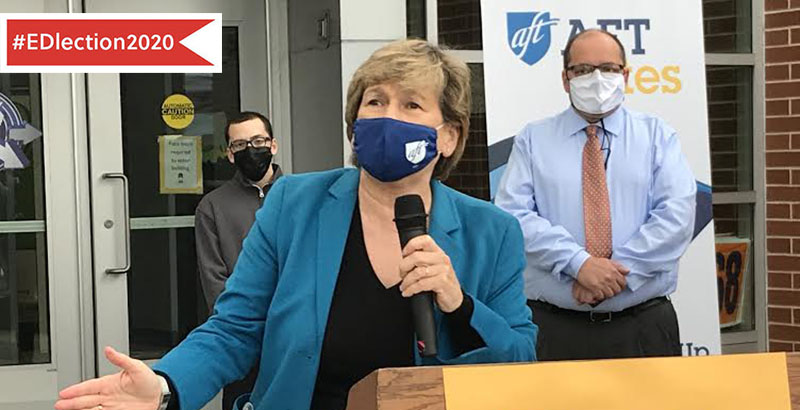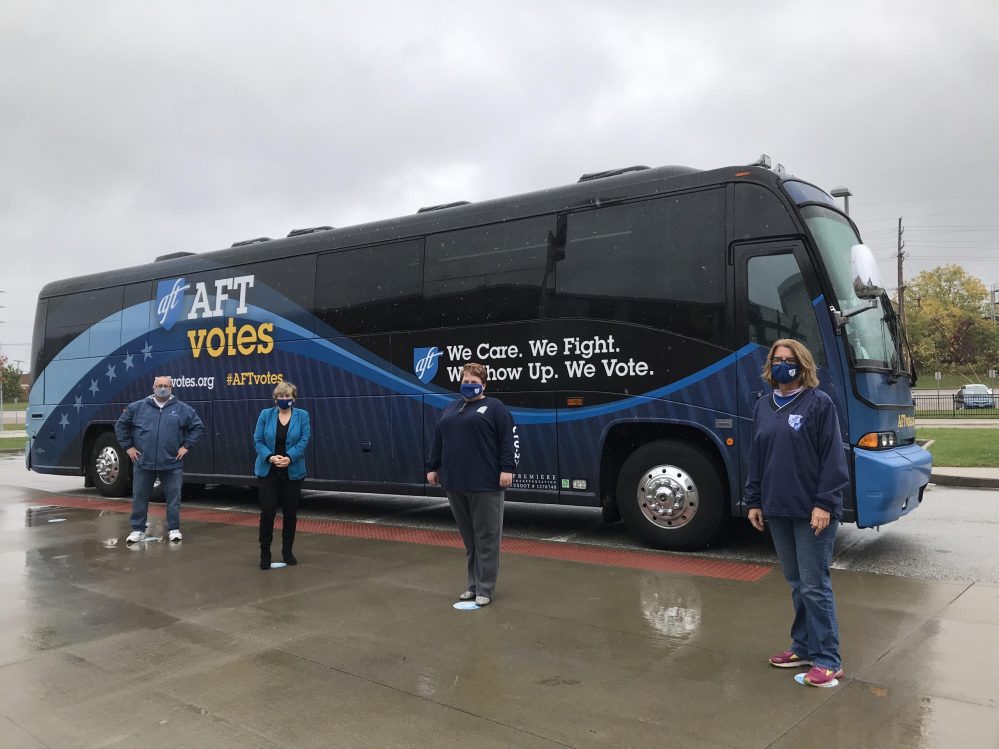Pressing Through a Campaign Under COVID: Five Ways the American Federation of Teachers Has Changed How it Rallies Members

American Federation of Teachers President Randi Weingarten usually draws a few hundred teachers whenever she comes to Cleveland.
On Tuesday? About a dozen. By choice.
Though the union of 1.7 million members nationwide usually relies on large rallies to throw a mass of voters behind issues and candidates it supports, COVID-19 has forced it to change tactics this election season.
That includes limiting crowds for safety reasons. Even as Weingarten came through the city on a month-long coast-to-coast bus tour in a final push to support Democratic Presidential nominee Joe Biden, the Cleveland Teachers Union did not call on members to come out for her morning stop at the May Hayes career training high school.
The union has also reworked how it communicates with members so it can rally votes for Biden and against President Donald Trump, who it has called a threat to the nation’s democracy.
“If you call this the most consequential election of your lifetime, then you have to act it,” said Weingarten, who stayed masked throughout her visit.
Here are five ways the AFT has changed to a virtual and rarely in-person approach:
1 Door knocking campaigning is out
In previous elections, volunteers would knock on doors of other members or members of other AFL-CIO unions to talk about candidates and issues and hand out literature. That’s not happening this year because of COVID-19, though some volunteers, like in Cleveland, are just dropping off campaign materials at homes.
2 Texts are in
The AFT used to rely on members talking in the teachers lounge or in school hallways to share information. This year, for the first time, it started a formal program to encourage members to text their peers.
3 New AFT Votes app
Union officials created a new phone app called “AFT Votes” to send members news updates and reminders, without needing to update phone numbers and email addresses and send out mass texts.
“Physical distancing might mean we’re apart, but it doesn’t mean we can’t connect,” the AFT website states. “Get the App. Stay in the fight.”
4 Virtual phone banks
COVID-19 has shut down the traditional phone bank, where several volunteers gather at union headquarters to call members about key issues. But the union has still called 100,000 members or more each month since July, with volunteers calling from home. As support for volunteers, the AFT hosts a Zoom room for them while they call. If they have questions about an issue or need emotional support after a difficult call, colleagues are on the Zoom to help out, just as they would be in the traditional phone bank.
The union hoped for 2,000 volunteers to make 100,000 calls this month. It already has 3,000 volunteers and has met its call goal. So it is now making a second round of calls to make sure members have voted early or mailed in ballots.
5 Bus tour
A tour bus painted blue with the words “AFT Votes” and “We Care. We Fight. We Show Up. We Vote.” started a month-long cross-country trip in Los Angeles Sept. 30 with stops in 18 states before ending in Miami on Nov. 1. Weingarten has done shorter regional bus tours in the past, but this is her longest, by far.

Some stops, like in Michigan and Pennsylvania, both swing states in the presidential election, are geared toward promoting Biden over Trump. In others, like Cleveland, Chicago and Los Angeles, Weingarten focuses on local tax issues affecting schools, with presidential or Congressional races added in.
In Cleveland Tuesday, Weingarten was joined by Cleveland school district, Cleveland Teachers Union and Ohio Federation of Teachers officials to promote Issue 68, a renewal and increase of a school tax for the Cleveland schools. The tax would be the first operating increase since 2012 and cover normal cost increases, along with maintaining the shift forced by COVID-19 to providing each student with a computer and internet access.
Along the way, she took a few swipes at Trump — “We see the president of the United States lying about everything every day” — and Betsy DeVos, his education secretary, for her “reckless disregard for children.”
She also urged Congress to pass a federal stimulus package to help schools cope with COVID-19.
“I believe it’s absolutely urgent to spend my October doing this,” she said, just before boarding her bus to head to Cincinnati. ”I’m happy to see the people that we’re seeing.”
But she also worried about the risk of traveling and gathering, even in a limited way, during the pandemic.
“Every time I have a negative COVID test, I’m relieved,” she said. “But I’m constantly concerned if I am putting people in harm’s way.”
Get stories like these delivered straight to your inbox. Sign up for The 74 Newsletter

;)
